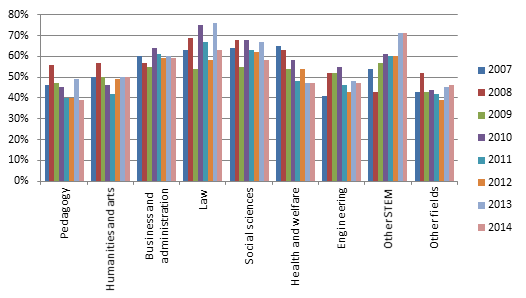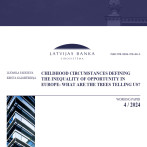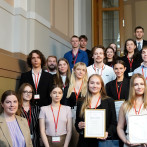Overproduction of economists and lawyers in Latvia? Let's debunk this myth
For Latvijas Banka Monthly Newsletter, In Focus, July 2016
A typical Econ101 course would tell us that prices of goods go down when supply exceeds demand. If Latvia would have overproduced university graduates in fields of social sciences, they would receive low wage premiums [1] compared to graduates of other study areas. This is not what we see in reality.
Last year we published a working paper showing that education has a positive and robust impact on wages and employment probability in Latvia. [2] Now we extend evidence by studying the impact of different education fields on wage. Contrary to media highlights about "overproduction of economists and lawyers", our results show particularly high returns to education in the fields of social sciences, law, business and administration as well as STEM.[3]
During the whole period of study (2007–2014), the higher education fields with the largest wage premiums were law (on average 66%[4]), social sciences (63%) as well as business and administration (59%). Wage premium for higher education was on average 52%. Similarly, a large wage premium was recorded in the STEM fields (60%), excluding engineering where it was only 48%. A clear upward trend in STEM may reflect an increasing demand for IT and hard science specialists. In turn, the lowest wage premiums among higher education fields were found in pedagogy (45%), mirroring the relatively low remuneration of teachers in Latvia, as well as in arts and humanities (49%). Before the crisis, graduates of the Health and Welfare Programme enjoyed one of the highest wage premiums. Afterwards, however, they decreased below the average, reflecting a major slowdown in public spending on healthcare.
Among secondary education fields, social science graduates are among the top earners as well. Their wage premium is 17%, while the average secondary education wage premium stands at 11%. A fascinating illustration of the impact of the economic cycle is wage premium of graduates of the Architecture and Building Programme. After exceeding 25% in 2007–2008, it slumped to less than 5% in 2011–2012 and rebounded to 12% afterwards. Contrary to the common view, graduates of vocational and professional secondary education institutions enjoy only a slightly higher wage premium than those of general secondary education establishments (12% and 10% respectively).
To conclude, graduates of the Social Science, Law, Business and Administration programmes enjoy relatively large wage premiums, suggesting that good economists and lawyers are still in high demand. Therefore, probably, the best thing government can do is to promote and reward education quality rather than to try and discourage youth from studying in the fields one believes suffer from "overproduction".
Higher education wage premiums in Latvia by field of education (%; compared to employees with lower than secondary education)

Source: Authors' calculations based on CSB Labour Force Survey micro data
[1] To measure wage premiums we compare otherwise identical individuals with the only difference being the field in which the most recent education was obtained.
[2] VILERTS Kārlis, KRASNOPJOROVS Oļegs, BRĒĶIS Edgars (2015) – Does Education Affect Wages during and after Economic Crisis? Evidence from Latvia (2006–2012). Latvijas Banka's Working Paper No. 3/2015. Available: https://www.macroeconomics.lv/working-paper-does-education-affect-wages-during-and-after-economic-crisis-evidence-latvia-2006-2012
[3] Science, technology, engineering and mathematics.
[4] Compared to employees with lower than secondary education.
Textual error
«… …»







